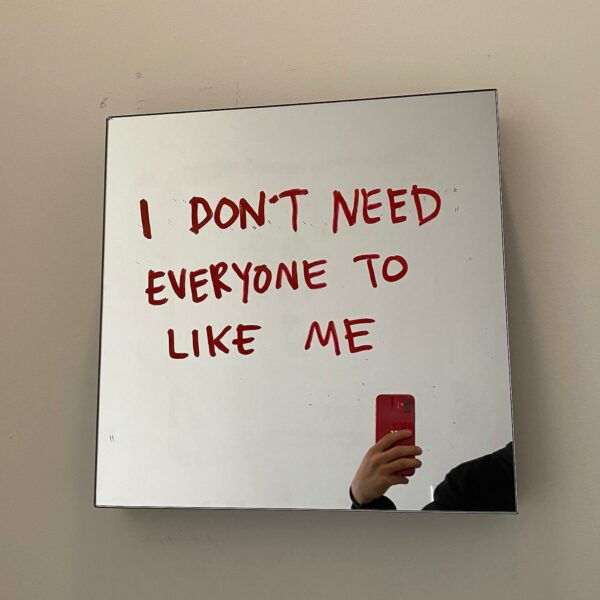Whether it’s a dating scenario like today’s reader submission or a conversation you can’t get off your brain—some situations call for reinforcement (like the 10 suggestions I’m sharing below) to really clear your mind and think about literally anything else besides what’s consuming your headspace due to a case of obsessive thinking.
Overthinking causes us to spend too much time on the same thoughts, getting stuck in a loop of inaction and turning positive reflection into debilitating worry. Not only does it not move us forward, but it also moves us backward and downward. I find this comes up a lot in dating. Worrying and overthinking about whether someone will call you or text you back, whether they like you, and did you say too much or too little are all common topics that come up when working with my clients.
I like to use DBT (Dialectical Behavioral Therapy) techniques to create awareness and provide my clients and you with the tools you will need to stop the worrying and overthinking. Here are my top 10 tips.
1. Look at the Bigger Picture
How will all the issues floating around in your mind affect you 5 or 10 years from now? Will anyone really care that you bought a fruit plate for the potluck instead of baking a pie from scratch? Don’t let minor issues turn into significant hurdles.
2. Remember the 90-10 Rule.
This is a formula, a ratio, for how you should calculate how you value yourself, based on 90% self-worth, 10% assigned worth. Ninety percent should come from your self-acceptance and self-appreciation, and just 10% from that occasional sliver of external validation we all need.
Overthinkers distort the formula, even reversing it by acting like 90% of their worth comes from what others think or say.
3. Assume Good Intent.
Overthinkers read too much into things. Why? They’re assuming something bad lies underneath, something like a bad perception, someone wishing them ill, or an unfavorable outcome. When you catch yourself doing this, switch your assumption to believe what you’re reading into was well-intended, or at least neutral. Most of the time, it really is, so why not act like it?
4. Replace “What If” with “We’ll See.”
Overthinkers keep asking themselves “what if,” which is an impossible question to answer. If you catch yourself asking “what if,” quickly switch it to “we’ll see,” which is a way of moving past analysis paralysis to acceptance.
5. Get Outside and Enjoy.
By this I mean stop spending so much time in your head. Get outside it and switch gears to connect with what’s going on around you so you can take joy in it.
6. Acknowledge Your Successes
When you are overthinking, stop and take out your notebook or your favorite note-taking app on your phone. Jot down five things that have gone right over the past week and your role in them.
These don’t need to be huge accomplishments.
When you look at it on paper or on-screen, you might be surprised at how these little things add up.
7. Practice Self-Compassion
Dwelling on past mistakes keeps you from letting go. If you’re beating yourself up over something you did last week, try refocusing on self-compassion.
8. Learn to Let Go
Some things will always be out of your control. Learning how to accept this can go a long way toward curbing overthinking.
9. Don’t Believe Every Thought
Don’t believe the lies your own mind tells you.
It seems like a simple enough statement, but it’s hard to do for people who are chronic worriers or who tend to overthink everything.
10. Replace the Thought Loop
Instead of focusing on a problem, whether in the past or the future, replace the rumination with a positive outlook. Focus on the outcome coming to a favorable end. Imagine the best intentions in others.
Flip the negatives into positives. Assume the best in people and visualize your successes.
We are all worthy of peace of mind, true happiness, and love.
So, remember this when you are taking things personally, over-analyzing, and worrying. Life is short, and we have to do our best to enjoy it!
Erica Spiegelman is a wellness specialist, recovery counselor, and author of the new book The Rewired Life (2018) as well as Rewired: A Bold New Approach to Addiction & Recovery(2015), the Rewired Workbook (2017), the Rewired Coloring Book (2017), all published by Hatherleigh Press. Erica holds a bachelor’s degree in literature from the University of Arizona and is a California State Certified Drug and Alcohol Counselor (CADAC)-II from UCLA. For more information, visit Erica’s website or follow @@Erica Spiegelman on Instagram.
The content provided in this article is provided for information purposes only and is not a substitute for professional advice and consultation, including professional medical advice and consultation; it is provided with the understanding that Poosh, LLC (“Poosh”) is not engaged in the provision or rendering of medical advice or services. The opinions and content included in the article are the views of the author only, and Poosh does not endorse or recommend any such content or information, or any product or service mentioned in the article. You understand and agree that Poosh shall not be liable for any claim, loss, or damage arising out of the use of, or reliance upon any content or information in the article.
Up next, be the first to know our weekly content and sign up for our Poosh newsletter.





































